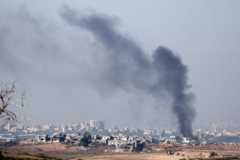Israel's renewed bombardment of Gaza is continuing into its second day, as the military warns civilians in some areas to evacuate. Fighting resumed on Friday after a seven-day ceasefire expired; Israel and Hamas have blamed each other for failing to agree an extension
- The Hamas-run health ministry in Gaza says more than 178 people have been killed since the bombing restarted; the Israeli military says it's struck 400 targets across the Strip
- The IDF says 50 strikes hit the area of Khan Younis in southern Gaza overnight. Civilians were told to go there earlier in the war for their safety
- Sirens were also heard in parts of Israel on Friday, with rockets fired from Gaza intercepted
- Meanwhile, aid trucks have been allowed into Gaza for the first time since the ceasefire ended on Friday
- The Hamas attack on Israel on 7 October killed 1,200 people, with around 240 others taken hostage
- Since then, Gaza's Hamas-run health ministry says more than 14,800 people have been killed in Israel's retaliatory campaign, including about 6,000 children.
Israel has carried out air strikes near Syria's capital Damascus, the Syrian defence ministry says.
AFP news agency quotes local sources as saying that two Syrian pro-Hezbollah fighters were killed in the overnight raids. Hezbollah militants - like Hamas - are backed by Iran.
Israel has renewed attacks on Iran-linked targets in Syria since the start of the Gaza conflict. There have also been exchanges of fire between Israel and Hezbollah forces across the Lebanese border.
There is no word from the Israeli army on the latest strikes.
The United Nation's relief agency for Palestinian refugees (UNRWA) says no aid has reached Gaza since the ceasefire between Israel and Hamas ended on Friday morning.
Juliette Touma, the spokeswoman for the UNRWA, tells the BBC: “What we are fearful of is that we go back to where we were in the first weeks where there was an absolute ban, an hermetic siege, on the Gaza Strip - with consequences that continue to be felt even today."
She says there are efforts to renew the delivery of humanitarian assistance, and calls for a ceasefire.
“We are at the doorstep of a humanitarian man-made tsunami in the Gaza Strip,” Touma adds.
The Israeli military resumed its war against Hamas in Gaza with force, saying it struck 400 “terror targets” across the territory since the end of the ceasefire yesterday.
Overnight, fighter jets hit positions in southern Gaza, which is likely to be the focus of the next phase of the Israeli offensive. Hundreds of thousands of Palestinians are sheltering there, after fleeing the north.
The attacks targeted areas around Khan Younis, where some members of the Hamas leadership are believed by Israel to be hiding. Parts of northern Gaza, where Israeli troops are carrying out a ground offensive, have also been hit with artillery and tank fire, the Israeli military said.
Across the territory, the humanitarian crisis continues. Hospitals, already on the verge of collapse, are crowded with civilian casualties from the strikes, many of them children.
The UN said no aid was sent to Gaza from Egypt yesterday, and the Palestinian Red Crescent said it had no guarantees that any supplies would be delivered today.
The US, one of Israel’s main supporters, has told Israeli authorities they must do more to protect the civilian population of Gaza. The message has been that the Israeli military should not repeat in the south what it did in the north.
Leaflets were dropped in areas around Khan Younis yesterday, with a QR code directing people to an online map of Gaza, broken down into hundreds of blocks, to direct people where to go. Internet and electricity are limited in Gaza so many are questioning whether this will be enough.
FULL REPORTS AND EVEN MORE DETAILS AT: Israel-Gaza live news: IDF orders evacuations as strikes hit targets across Gaza - BBC News



No comments:
Post a Comment